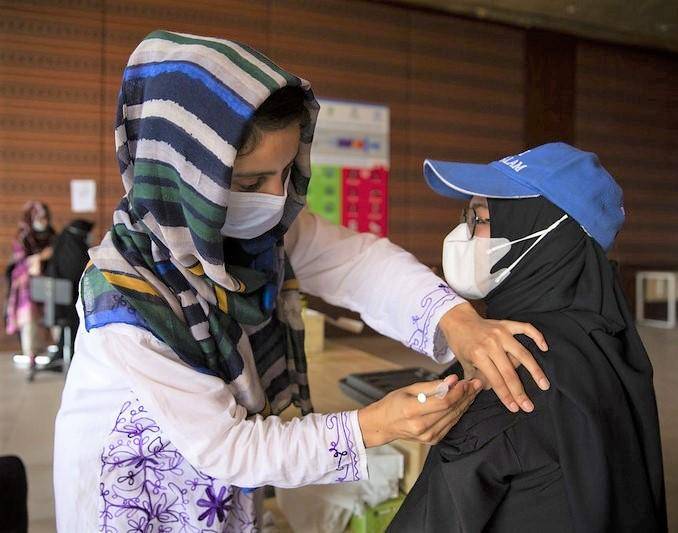Positivity ratio crashes as infections nosedive in Pakistan
NIH data shows daily number of tests stands at over 3,000: British man died of rare blood syndrome linked to AstraZeneca’s vaccine

Stay tuned with 24 News HD Android App

Pakistan has added up 20 more Covid-19 infections with no fatality during the last 24 hours (Thursday), showed the data released by the National Institute of Health (NIH) on Friday morning, reported 24NewsHD TV channel.
According to the NIH data, the death toll in the country remained the same at 30,656 whereas the number of total infections now soared to 1,580,542 after adding the fresh 20 cases.
During the last 24 hours (Thursday), 3,377 tests were conducted throughout Pakistan whereas the positivity ratio stood at 0.59%. The number of patients in critical care stood at 14.
COVID-19 Statistics 21 April 2023
— NIH Pakistan (@NIH_Pakistan) April 21, 2023
Total Tests in Last 24 Hours: 3,377
Positive Cases: 20
Positivity %: 0.59%
Deaths: 00
Patients on Critical Care: 14
(shared by NCOC-NIH)
Psychologist died of rare blood syndrome linked to AstraZeneca’s vaccine
A 32-year-old psychologist in Britain developed blood clots and died 10 days after he took his first dose of AstraZeneca’s Covid vaccine, a report released by a London coroner found, in a highly rare case of a fatal reaction to the vaccine.
The inquest, which was requested by Charlotte Wright, the widow of Dr Stephen Wright, found that he died on Jan 26, 2021, as a result of “unintended consequences of vaccination.” Ms Wright is suing AstraZeneca.
According to the report, Dr Wright, of Kent, England, had a stroke and bleeding in the brain, as well as vaccine-induced thrombosis, or blood clots, and thrombocytopenia, a condition that occurs when the platelet level in the blood is abnormally low.
Since 2021, researchers have cited rare cases in which people have developed the blood-clotting syndrome known as TTS after receiving the Johnson & Johnson or AstraZeneca Covid vaccines, which are similar. The cases typically occur within weeks of vaccination.
Experts still strongly recommend vaccination, saying that although vaccines are associated with certain rare side-effects, those risks are dwarfed by the risks of the coronavirus itself.
“It’s really quite rare and, at the end of the day, you need to consider the risks versus the benefits with anything you do,” said Daniel Salmon, director of the Institute for Vaccine Safety at Johns Hopkins Bloomberg School of Public Health. “And when you look at the vaccines, they’re very safe and very effective.”
He added: “Nothing is risk-free. And if you choose not to get the vaccine, then you’re at greater risk for getting the disease and serious consequences.”

Researchers have estimated that coronavirus vaccines have saved millions of lives, including an estimated 507,000 in the United Kingdom in the first year they were administered.
Dr Beverley Hunt, a thrombosis expert in London, said that the blood-clotting syndrome was a “very rare event” following the use of the AstraZeneca vaccine, estimated to occur in one in 50,000 people under 40 and one in 100,000 over 40.
Dr Adam Finn, a professor of paediatrics at the University of Bristol, said that very approximate figures suggest that about 50 million doses of the AstraZeneca vaccine have been given in the United Kingdom, with about 200 cases and 40 deaths linked to the blood-clotting syndrome.
Britain curbed the use of AstraZeneca’s vaccine for people under 30 in April 2021, citing the risk of rare blood clots.
In the United States, the Food and Drug Administration limited the use of Johnson & Johnson’s vaccine in May 2022 to adults who cannot or who refuse to get the Pfizer-BioNTech or Moderna vaccines, also citing the risk of rare blood clots.
AstraZeneca’s Covid vaccine has not been approved for use in the United States, and last year the company withdrew its application for F.D.A. approval.
In Australia, the country’s Department of Health and Aged Care described TTS as a rare syndrome that had occurred in around two to three people per 100,000 who had been given the AstraZeneca vaccine.
Symptoms — including severe, persistent headache and blurred vision — typically occur between four and 42 days after a first dose of the AstraZeneca vaccine, the department said.
Australia stopped the use of AstraZeneca’s vaccine last month, saying newer vaccines better targeted current strains of the virus.
In an analysis released last month of immunization and death records in Britain, researchers found that young women who received at least one dose of AstraZeneca’s vaccine might have been more likely to die of a heart problem in the 12 weeks after their vaccination.
The researchers did not find a significantly elevated risk of death in any other subgroup or with the Pfizer-BioNTech vaccine, which was also widely used in Britain. And the study did not prove that the vaccines caused the deaths.
Andrew Harris, a senior coroner who presented the results of Dr Wright’s inquest at London Inner South Coroner’s Court on Wednesday, described Dr Wright’s death as a “very unusual and deeply tragic case,” the BBC reported.
